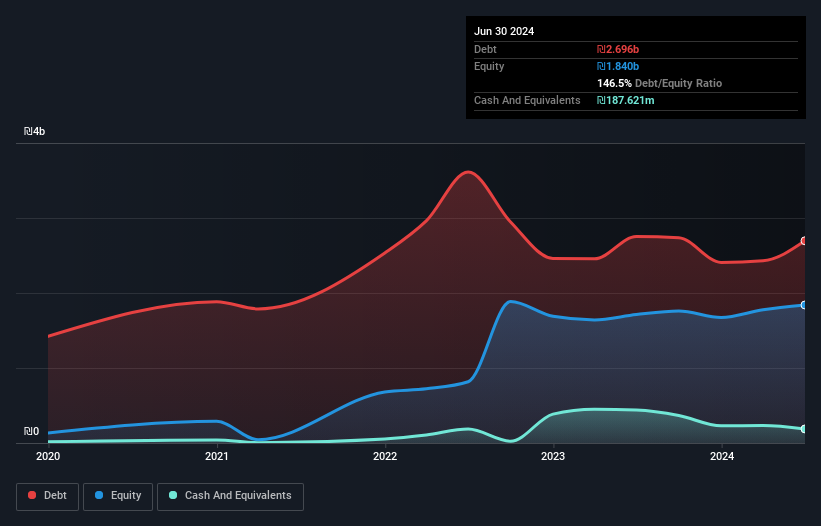Some say volatility, rather than debt, is the best way to think about risk as an investor, but Warren Buffett famously said that 'Volatility is far from synonymous with risk.' When we think about how risky a company is, we always like to look at its use of debt, since debt overload can lead to ruin. We can see that Shikun & Binui Energy Ltd (TLV:SBEN) does use debt in its business. But the real question is whether this debt is making the company risky.
When Is Debt A Problem?
Generally speaking, debt only becomes a real problem when a company can't easily pay it off, either by raising capital or with its own cash flow. In the worst case scenario, a company can go bankrupt if it cannot pay its creditors. While that is not too common, we often do see indebted companies permanently diluting shareholders because lenders force them to raise capital at a distressed price. By replacing dilution, though, debt can be an extremely good tool for businesses that need capital to invest in growth at high rates of return. The first step when considering a company's debt levels is to consider its cash and debt together.
View our latest analysis for Shikun & Binui Energy
What Is Shikun & Binui Energy's Net Debt?
As you can see below, Shikun & Binui Energy had ₪2.70b of debt, at June 2024, which is about the same as the year before. You can click the chart for greater detail. On the flip side, it has ₪187.6m in cash leading to net debt of about ₪2.51b.

How Strong Is Shikun & Binui Energy's Balance Sheet?
According to the last reported balance sheet, Shikun & Binui Energy had liabilities of ₪357.8m due within 12 months, and liabilities of ₪2.85b due beyond 12 months. Offsetting these obligations, it had cash of ₪187.6m as well as receivables valued at ₪249.7m due within 12 months. So its liabilities outweigh the sum of its cash and (near-term) receivables by ₪2.77b.
When you consider that this deficiency exceeds the company's ₪2.65b market capitalization, you might well be inclined to review the balance sheet intently. In the scenario where the company had to clean up its balance sheet quickly, it seems likely shareholders would suffer extensive dilution. When analysing debt levels, the balance sheet is the obvious place to start. But it is Shikun & Binui Energy's earnings that will influence how the balance sheet holds up in the future. So if you're keen to discover more about its earnings, it might be worth checking out this graph of its long term earnings trend.
In the last year Shikun & Binui Energy had a loss before interest and tax, and actually shrunk its revenue by 3.4%, to ₪132m. We would much prefer see growth.
Caveat Emptor
Over the last twelve months Shikun & Binui Energy produced an earnings before interest and tax (EBIT) loss. To be specific the EBIT loss came in at ₪65m. When we look at that alongside the significant liabilities, we're not particularly confident about the company. It would need to improve its operations quickly for us to be interested in it. Not least because it burned through ₪137m in negative free cash flow over the last year. That means it's on the risky side of things. When analysing debt levels, the balance sheet is the obvious place to start. However, not all investment risk resides within the balance sheet - far from it. To that end, you should learn about the 2 warning signs we've spotted with Shikun & Binui Energy (including 1 which is significant) .
Of course, if you're the type of investor who prefers buying stocks without the burden of debt, then don't hesitate to discover our exclusive list of net cash growth stocks, today.
New: Manage All Your Stock Portfolios in One Place
We've created the ultimate portfolio companion for stock investors, and it's free.
• Connect an unlimited number of Portfolios and see your total in one currency
• Be alerted to new Warning Signs or Risks via email or mobile
• Track the Fair Value of your stocks
Have feedback on this article? Concerned about the content? Get in touch with us directly. Alternatively, email editorial-team (at) simplywallst.com.
This article by Simply Wall St is general in nature. We provide commentary based on historical data and analyst forecasts only using an unbiased methodology and our articles are not intended to be financial advice. It does not constitute a recommendation to buy or sell any stock, and does not take account of your objectives, or your financial situation. We aim to bring you long-term focused analysis driven by fundamental data. Note that our analysis may not factor in the latest price-sensitive company announcements or qualitative material. Simply Wall St has no position in any stocks mentioned.
About TASE:SBEN
Shikun & Binui Energy
Develops, finances, constructs, and operates of power generation plants based on solar, hydro, wind, and natural gas energies in Israel and internationally.
Very low risk with worrying balance sheet.
Similar Companies
Market Insights
Community Narratives



